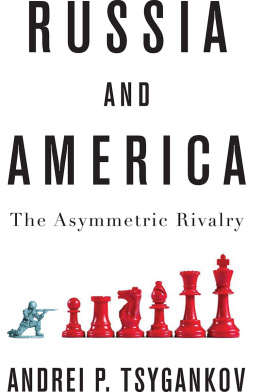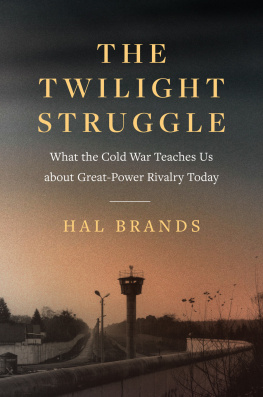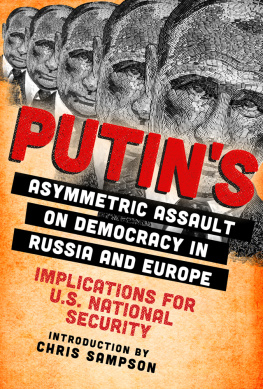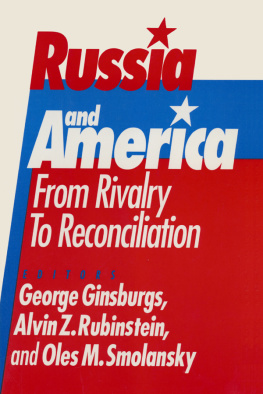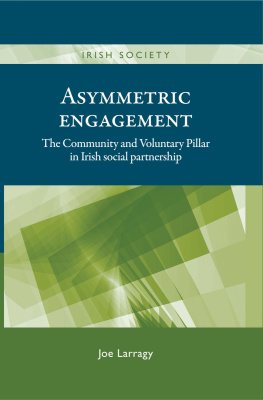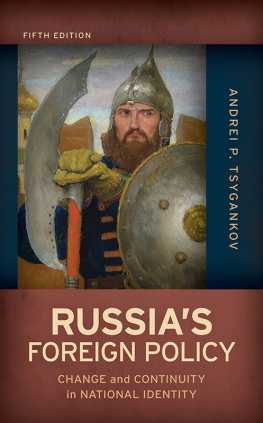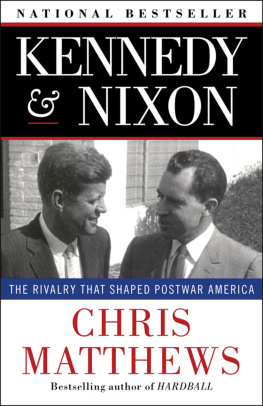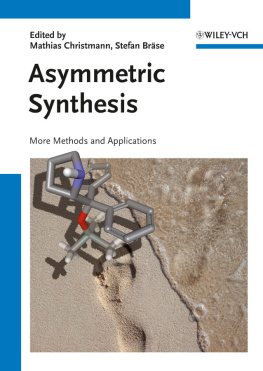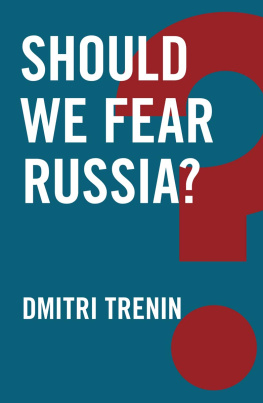Tsygankov - Russia and America : the asymmetric rivalry
Here you can read online Tsygankov - Russia and America : the asymmetric rivalry full text of the book (entire story) in english for free. Download pdf and epub, get meaning, cover and reviews about this ebook. City: United States--Russia (Federation), year: 2019, publisher: Polity, genre: Politics. Description of the work, (preface) as well as reviews are available. Best literature library LitArk.com created for fans of good reading and offers a wide selection of genres:
Romance novel
Science fiction
Adventure
Detective
Science
History
Home and family
Prose
Art
Politics
Computer
Non-fiction
Religion
Business
Children
Humor
Choose a favorite category and find really read worthwhile books. Enjoy immersion in the world of imagination, feel the emotions of the characters or learn something new for yourself, make an fascinating discovery.
Russia and America : the asymmetric rivalry: summary, description and annotation
We offer to read an annotation, description, summary or preface (depends on what the author of the book "Russia and America : the asymmetric rivalry" wrote himself). If you haven't found the necessary information about the book — write in the comments, we will try to find it.
Tsygankov: author's other books
Who wrote Russia and America : the asymmetric rivalry? Find out the surname, the name of the author of the book and a list of all author's works by series.
Russia and America : the asymmetric rivalry — read online for free the complete book (whole text) full work
Below is the text of the book, divided by pages. System saving the place of the last page read, allows you to conveniently read the book "Russia and America : the asymmetric rivalry" online for free, without having to search again every time where you left off. Put a bookmark, and you can go to the page where you finished reading at any time.
Font size:
Interval:
Bookmark:

We live in a wondrous time, in which the strong is weak because of his scruples and the weak grows strong because of his audacity.
Otto von Bismarck
Andrei P. Tsygankov
polity
Copyright Andrei P. Tsygankov 2019
The right of Andrei P. Tsygankov to be identified as Author of this Work has been asserted in accordance with the UK Copyright, Designs and Patents Act 1988.
First published in 2019 by Polity Press
Polity Press
65 Bridge Street
Cambridge CB2 1UR, UK
Polity Press
101 Station Landing
Suite 300
Medford, MA 02155, USA
All rights reserved. Except for the quotation of short passages for the purpose of criticism and review, no part of this publication may be reproduced, stored in a retrieval system or transmitted, in any form or by any means, electronic, mechanical, photocopying, recording or otherwise, without the prior permission of the publisher.
ISBN-13: 978-1-5095-3116-5
A catalogue record for this book is available from the British Library.
Library of Congress Cataloging-in-Publication Data
Names: Tsygankov, Andrei P., 1964- author.
Title: Russia and America : the asymmetric rivalry / Andrei P. Tsygankov.
Description: Medford, MA : Polity Press, [2019] | Includes bibliographical references and index. |
Identifiers: LCCN 2019007297 (print) | LCCN 2019020344 (ebook) | ISBN 9781509531165 (Epub) | ISBN 9781509531134 (hardback) | ISBN 9781509531141 (pbk.)
Subjects: LCSH: United States--Relations--Russia (Federation) | Russia (Federation)--Relations--United States. | Geopolitics--Russia (Federation) | Security, International.
Classification: LCC E183.8.R9 (ebook) | LCC E183.8.R9 T885 2019 (print) | DDC 327.73047086--dc23
LC record available at https://lccn.loc.gov/2019007297
The publisher has used its best endeavours to ensure that the URLs for external websites referred to in this book are correct and active at the time of going to press. However, the publisher has no responsibility for the websites and can make no guarantee that a site will remain live or that the content is or will remain appropriate.
Every effort has been made to trace all copyright holders, but if any have been overlooked the publisher will be pleased to include any necessary credits in any subsequent reprint or edition.
For further information on Polity, visit our website: politybooks.com
I began writing about US-Russia relations some fifteen years ago. When my book Russophobia: Anti-Russian Lobby and American Foreign Policy was published in 2009, I was hopeful that the two countries could overcome the divisive politics of the past and be guided by considerations of mutual national interest and global stability. Unfortunately, after a brief period of trying to engage in dialogue during 200910, relations between America and Russia entered an era of crisis from which they have not been able to find a path toward dialogue and cooperation. Both countries now frequently resort to accusations and ultimatums, eschewing diplomacy and honest discussion. The thin layer of trust that had existed in US-Russia relations has now all but evaporated.
As academics, the main thing we can do to contribute to the worlds peace is to write good books and teach good students. I have been trying to do both and was happy to respond to Politys invitation to write a book about Russia and America. When the publisher approached me, I had been teaching a course on Russia and the world order and thinking about the global changes that have affected Russias relations with the United States. My courses and students remain a source of energy and inspiration. Most of my work is connected to or has grown out of the courses that I am privileged to teach at San Francisco State University.
My other source of ideas includes the scholars and intellectuals with whom I have been fortunate to interact and discuss some of my thoughts at various meetings, conferences, and forums. Many people in America, Europe, Russia, and China deserve credit for engaging me in stimulating conversations, inviting me to conferences, and helping me formulate the ideas expressed in this book.
Several reviewers of the book offered multiple suggestions on how it might be improved. Some of these hopefully the best ones I have utilized in producing the final draft.
My publisher Louise Knight has been very encouraging throughout the process, and provided excellent advice on softening my prose and improving the books structure and content. I also thank Sophie Wright, Tim Clark, and everyone else at Polity responsible for the books editing, production, design, and appearance. Matthew Tarver-Wahlquist provided editorial assistance and helped with proofreading the text. Needless to say none of the above-mentioned is responsible for the books content or any errors it may contain.
Parts of several chapters draw on portions of my previously published works: Russophobia (Palgrave, 2009), Russia and the West from Alexander to Putin (Cambridge University Press, 2012), The Strong State in Russia (Oxford University Press, 2014), Vladimir Putins Last Stand, Post-Soviet Affairs 31:4 (2015); Russias Foreign Policy, 4th edition (Rowman & Littlefield, 2016), Relations with the United States, in Stephen Wegren, ed. Putins Russia (Rowman & Littlefield, 2018), and The Dark Double (Oxford University Press, 2019). I would like to thank the publishers for permission to use these materials.
Finally, and as always, I wish to thank my family in Russia and America for their love and support and for simply being who they are. I dedicate this book to them, to my friends, and to all those open to dialogue whatever their political viewpoint. Even though this book is about power, it is also about ideas, the potential for dialogue, and the hope of a better future.
In transliterating names from the Russian, I have used y to denote , to denote and , yu to denote , ya to denote , i to denote and , iyi to denote double , e to denote , kh to denote , zh to denote , ts to denote , ch to denote , sh to denote , and sch to denote . I have also used Ye to distinguish the sound of (such as Yevropa) at the beginning of a word from that in the middle of a word (such as vneshnei). I have not distinguished between and . Original spelling is retained in quotations.
Rivals, Not Enemies
Ever since Donald Trumps unexpected rise to power, the 2016 US presidential election has become the lens through which to view US-Russia relations. Many in the West believe that Russia interfered in the electoral process by hacking the Democratic National Conventions emails and promoting Trump on social media. Few have questioned the fact of Moscows interference. While disputing its extent, politicians, experts, and journalists alike have overwhelmingly accepted it as reality. Even those who reject this consensus view agree that the election became a critically important event which continues to profoundly affect relations between the two countries.
This book seeks to understand how Russias foreign policy has changed since Vladimir Putins return to presidency in 2012, and how that change has contributed to a new conflict with America. I argue that Russias goals and its means to achieve them should be understood in the context of an international transition toward a post-Western and multipolar world. The events of 2016 were crucial in making such transition irreversible. The Wests lack of recognition of Russias interests culminated in the conflict over Ukraines 2014 Euromaidan revolution, and compelled the Kremlin to take unprecedented steps in defense of its perceived interests, including annexing Crimea, supporting Ukrainian separatists, and intervening in the political and media spaces of the United States and several other Western countries. Although historically the essential drivers of Russias international actions had to do with the protection of its geographically limited national interests, Moscow was now prepared to defend those interests in an increasingly aggressive and global fashion. The United States dismissiveness toward the Kremlins complaints, Russias preoccupation with security and great power status, and Vladimir Putins character have all caused US-Russia relations to deteriorate to the point of what both sides acknowledge is an all-time low.
Next pageFont size:
Interval:
Bookmark:
Similar books «Russia and America : the asymmetric rivalry»
Look at similar books to Russia and America : the asymmetric rivalry. We have selected literature similar in name and meaning in the hope of providing readers with more options to find new, interesting, not yet read works.
Discussion, reviews of the book Russia and America : the asymmetric rivalry and just readers' own opinions. Leave your comments, write what you think about the work, its meaning or the main characters. Specify what exactly you liked and what you didn't like, and why you think so.

